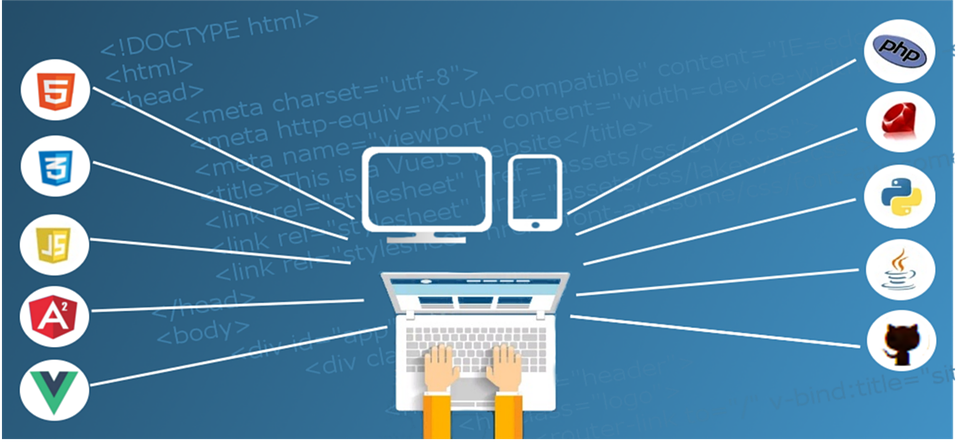The best first step to becoming a Web Developer is to start learning web development fundamentals, including an understanding of HTML (Hypertext Markup Language), CSS (Cascading Style Sheets), and JavaScript.
- Build web developer skills. …
- Consider a degree in computer science or web design. …
- Take a course in web development. …
- Built a portfolio of web development work. …
- Get certified.
What is web development?
A web developer’s job is to create websites. While their primary role is to ensure the website is visually appealing and easy to navigate, many web developers are also responsible for the website’s performance and capacity.
The best first step to becoming a Web Developer is to start learning web development fundamentals, including an understanding of HTML (Hypertext Markup Language), CSS (Cascading Style Sheets), and JavaScript.
It’s important to note that Web Developers – more than most other fields – must be committed to ongoing learning to stay on top of changes in web development and programming languages, tools, and trends. This makes mid-career retraining a must whether or not it’s the line of work you started out in.
Types of Web Developers
- Front-End Developer
These web developers focus on the user-facing sides of websites. They create intuitive user interfaces with a keen eye for compelling design.
- Back-End Developer
Back-end developers specialize in websites’ nuts and bolts, optimizing the crucial hidden elements most users never see. They often design databases and use languages like PHP, CSS, or Python.
- Full-Stack Developer
Full-stack web developers combine front-end and back-end development. They consider the creation process from both angles and possess the skills to complete tasks on either end of the spectrum
1. Is now a good time to become a web developer? (2022 update)
Before you jump into a new career, it’s important to consider the path ahead. Can your new industry offer you ample opportunities and stability? How likely are you to get hired after you’ve graduated from your chosen program or bootcamp?
In the wake of the past two years these questions are more important than ever. The Covid-19 pandemic has had a major impact on the economy and on the job market. Initially in 2020 the pandemic caused hiring to slow down, as global lockdowns took effect. However the vaccine rollout and economic bounce-back led to an increase in 2021, with hiring only slowing towards the end of year, according to a report by Glassdoor. However, the report also points out that 69% of the employment shortfall comes from the leisure and hospitality, education and healthcare industries, which are particularly Covid-sensitive.
This is yet another indication that workers are gravitating towards industries and roles which are more “Covid-proof”, such as tech. With that in mind, let’s take a look at the state of the web development industry in 2022
Are web developers in demand right now?
You’ll have noticed that, no matter what’s going on in the world around us, technology is omnipresent in our lives. Whether it’s scrolling through our favorite social media apps, checking the news, paying for something online, or connecting with colleagues using collaboration software and tools—most of what we do relies on some form of technology. Behind this technology is a team of web developers who have not only built it, but constantly maintain it to ensure it works flawlessly.
Web developer tasks and responsibilities
As a web developer, you could work for a company or agency, or as a freelancer taking on projects for individual clients. Your tasks will vary depending on your work situation, but day-to-day responsibilities might generally include:
-
- Designing user interfaces and navigation menus
- Writing and reviewing code for sites, typically HTML, XML, or JavaScript
- Integrating multimedia content onto a site
- Testing web applications
- Troubleshooting problems with performance or user experience
- Collaborating with designers, developers, and stakeholders
How much do web developers make?
The median annual salary for web developers in the rupee is a Aprox..5,404,000 , according to the Bureau of Labor Statistics (BLS). However, web developers in the Rupee can earn up to Aprox..17,450,790 according to Glassdoor salary insights . How much you earn will depend on many factors, including where you work, what industry you work in, and how much experience you have.
Current projections show faster than average growth of these jobs through 2030, according to the BLS. One of the driving forces behind this increase in web development jobs is the growth of e-commerce. Companies are becoming more reliant on functioning websites that operate on multiple devices to do business.
Technical skills
-
- Coding: Common programming languages include HTML, PHP, cascading style sheets, and JavaScript for front-end design. Consider learning Python, Java, or Ruby if you want to do back-end development.
- Responsive design: People use a variety of devices to view websites. Developers should be able to create sites that look as good on smartphones and tablets as they do on computer screen.
- Technical SEO: Many factors of website design can affect the site’s search engine ranking. Understanding how search engines rank sites is useful in a developer’s work.
- Visual design: Understanding basic design principles, such as how to use white space, choose fonts, and incorporate images could boost your marketability.
Workplace skills
- Communication: Web developers spend time discussing design ideas with their clients and team members through each step of the project.
- Customer service: A web developer creates websites for the client to use and should remain client-focused to achieve the best results.
- Detail-oriented: Little details, like a small change in code, can make a big difference in how a website performs.
- Organization: Keeping track of deadlines, project tasks, workflow, and budgets is helpful if you want to complete a website design on time.
- Problem-solving: Web developers often run into issues when designing websites. They should have the patience and ability to identify problems in the design or coding and solve them in a methodical way.
2. Consider a degree in computer science or web design.
While you don’t always need a degree to get a job in web development, it can certainly help. If you’re already in school (or considering earning a degree), some majors might be a better fit for your career goals than others. If you’re more interested in back-end web development, consider a degree program in computer science. If you feel more drawn to front-end development, you might opt for a degree in web design or user experience (UX).
3. Take a course in web development.
You don’t necessarily need formal training to work as a web developer. It’s possible to acquire the skills you need on your own. For example, you can take a course to learn programming languages like HTML, JavaScript, or CSS, and then put what you learn into practice on your own website.
By completing an online course in web development, like Web Design for Everybody: Basics of Web Development & Coding from the University of Michigan, you can build skills while completing development projects for your portfolio.
Get a feel for what the course is like by watching this video on interactivity with JavaScript:
4. Built a portfolio of web development work.
As a web developer, your portfolio is often one of the most important parts of your resume. This collection of projects shows potential employers what you’re capable of creating. Include the types of projects that represent the work you’d like to do. If you’re including code, be sure to annotate it to show your thought process.
5. Get certified.
Earning a certification can validate your skill set to potential employers. You’ll find a range of general and vendor-specific options, including Udaan Institute of Information Technology certificates for Web Development Course. Other certificate like Adobe Certified Expert (ACE), Microsoft Certified Solutions Associate (MCSD), Amazon Web Services (AWS) Certified Developer, or Zend Certified PHP Engineer.



